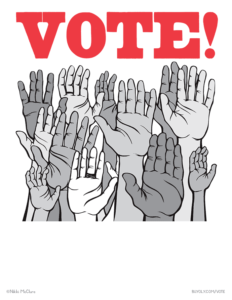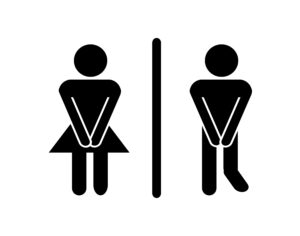
Vote! poster by Nikki McClure
Free and downloadable from https://buyolympia.com/vote
For Democrats, registered or not,* and other progressives, plus anyone else on the blue-purple side: Guidelines for working together with respect, and getting out the vote.
1) Check your registration status. More than once.
Just to get this out of the way: Make sure you are registered to vote. Vote.org has a page for checking voter registration. Skip the form at the top if you don’t want to sign up for a mailing list; scroll down the page for links to each state’s official site. Also, here is a link to the voter registration deadlines in every US state for 2020 primary elections: A chart, and also a description for each state/territory and the different methods of registering.
So check. Especially if you have recently moved, but also if you haven’t. Tell your friends to check, especially if they haven’t voted recently. And later, check again. If there’s anything we know, we know that voter suppression is alive and well — and likely to get worse.
Voter Suppression Could Reach New Heights in 2020 – Unless We Push Back (Truthout, 2020).
‘Tidal wave of voter suppression’ washes over states (NBC News, February, 2020)
Vote: Because Others Can’t (My analysis of voter suppression in November, 2018)
The Messy Politics of Voter Purges (Pew Trusts, October, 2019)
In Closely Divided Wisconsin, the Battle for Votes Is Already Underway (NY Times, January, 2020)
2) During the primaries, support the candidate(s) you support.
This is exactly the right time to argue your case, and your candidate’s case, in the court of public opinion. Learn new things, read the platforms, find out what you can, and tell people what you know. There is no need for all Democrats to pick a particular candidate ahead of time that everyone can agree on. That’s what the primary elections and caucuses are for.**
Support your candidate(s) loudly and proudly. Recognize places they may be missing the mark, and consider telling them so. If you change your mind, do it because you have weighed the issues, not because of peer pressure, or because people are acting as though one candidate or another is somehow more or less presentable. Don’t go underground.***
3) After the primaries, support the candidate who won.
Someone queried recently, on a thread I was reading, that if we are encouraged to “choose party over candidate” by agreeing to “vote blue no matter who,” then how are we better than the current administration? My response was twofold: one, that no one of the current candidates in the Democratic field is close to as vicious, demeaning, cruel, or dangerous as the current president: if there were someone like that, this advice would not hold (updated to add: but see Bloomberg, below****); and two, in contrast to “choosing party over candidate,” the current administration and its elected supporters have chosen party over country, over Constitution, and over human decency.
No one here is terrible (again,****). They all have flaws. And their work is important. Only by managing our disappointment and unifying our positions will we be able to turn back the tide of cruel and disastrous policies that have flowed from the white house in these years, and cruel and disastrous appointments that will otherwise keep those policies going for generations.
Not Voting is Not A “Statement” (John Pavlovitz, October, 2019)
By the way, I was going to say, “This is not the time for voting third party,” and then I recognised it as the kind of thing that people get told over and over again, as if you just have to wait for one more cycle, and that it’s kind of maddening. I was mad at my parents for saying it in 1980. If they wanted Anderson, why not vote for him instead of Carter? And I think the answer is, while the nation is so closely divided (well, when taking into account voter suppression and the electoral college), with razor thin edges, then the Presidential election will continue to be “not the time” for this kind of statement. I love that third party candidates have been winning at the local and state levels. I want that to be viable. But too many countrywide elections in my lifetime have been close enough to sway by the votes that go to third parties, with devastating effects, and I don’t foresee that changing any time soon.
4) Do not try to convince yourself or others that someone is so bad that you can’t vote for them, because we need those votes later.
If you don’t like someone’s policies, or past behavior, it’s fine to talk about it, or campaign against it. But understand that there will be someone running against the executive in the White House, and there is no way any of these people could be as dangerous as the current resident.
Remember: there are people all across this country whose lives and livelihoods and day-to-day safety depend on the ending of the current right-wing administration, regardless of where the next President falls along the progressive spectrum.
At the Women’s March last month, I heard activist Tyunique Nelson say the following:
“If you are not centering the experiences of those among you who are most marginalized, then what are you doing?”
Pay attention. Work together. Commit to ending this crisis.
5) Understand that “electability” is a dangerous myth.
One thing is clear to me: spreading doubts about any candidate’s “electability” will cause more damage than the actual reality of who people will vote for in the general election.
The idea of converging upon an “electable” candidate is extremely loaded. It makes people want to do what feels safe. It was interesting reading in the articles below the notion that people’s idea of a candidate’s electability is based on who has won previously in the same position. And so, despite the number of, say, women of color elected to other offices in the past two years, the people who are deemed “electable” turn out mainly to be older, white men.
Honestly, the number of people who don’t vote at all in American elections is so high that trying to pick your candidates based on what other people might or might not do will only lead to less integrity, not better turnout.
And here’s the thing: it’s all just hearsay.
A couple of people have told me, unprompted, that while they personally like her policies, there are many people who simply won’t vote for Elizabeth Warren in the general. Never the person who’s saying this, you understand — just other people that we can’t know or control. So they don’t want to put their support behind her.
But you know what? That’s true of every candidate. People everywhere are vastly different, and every candidate will have large numbers of people who are so angry about something the candidate has done, or so disappointed in a loss by their own candidate, that they will refuse to vote for them in November on principle. But if we convince ourselves to join those people, then no, our candidate will not have support, and, very possibly, none will have enough.
Our job now is to make voting for everyone more appealing. If you hear someone saying that “people won’t vote for” a candidate, and that this is therefore a good reason not to support someone, this means it is your job to convince them otherwise. Find out what they really think, talk about what you think, and focus on yourselves as actual voters, not on the hypothetical ones whose imagined whims might make this decision for you.
Democrats are prioritizing “electability” in 2020. That’s a coded term. (Vox, April, 2019)
The Word Female Presidential Candidates Have Been Hearing Over and Over (NY Times, January, 2020)
Column: Stop telling us about ‘electability’ – Opinion (Metro West Daily News, January, 2020)*****
6) No humiliation, no misogyny, no racism, no insults. Don’t do it. Don’t stand for it.
No humiliation:
The photoshopping has begun again, but at least the Sanders toboggan still has everyone smiling and having fun, not like the boxing gif of 2016. Not like the insidious “I mix up Star Wars and Star Trek”/”I don’t understand jazz” memes that were designed to look like real quotes from Clinton. Consider no photoshopping at all (do we really want to be like Representative Paul Gosar?). Don’t forward these things, if their main purpose is to make someone look bad, or to make someone look bad for a laugh. Make sure to call out people who do.
But mostly, don’t try to make anyone out to be a loser, or a “lesser evil”. No one here is a loser, so don’t use insults or humiliation for contrast with your own candidate, when, instead, you could use policy and your own enthusiasm. Otherwise, as mentioned above, you run the risk of convincing yourselves and others not to vote. And that is the biggest danger here. If we band together, the Democrat wins. If we splinter, the Democrat loses, and the reign of cruelty continues.
No misogyny:
It was appalling to see the amount of misogynistic stuff being passed along by supporters of Bernie Sanders in 2016, even from people I know who are otherwise nice people: from persistent double-standards to rude memes, from repeating long-standing right-wing insults to brand new hashtag-bern-the-witch. And so many of them were based on sexist tropes that should have been gone by then, and certainly not perpetuated by anyone supporting progressive values. The Star Trek and jazz memes I just mentioned? I eventually learned they originated as “blonde” jokes.
And, most fascinating (and infuriating), people bent over backwards to insist that their issues with Hillary Rodham Clinton were not based in sexism. I’d personally like to see whether that is true. Therefore, I decree that anyone who said, even once, in 2016, “It’s not because she’s a woman: If Elizabeth Warren were running, I’d vote for her,” is now honor bound to follow through.******
America loves women like Hillary Clinton–as long as they’re not asking for a promotion (Sady Doyle, QZ, February, 2016)
The Erasure of Elizabeth Warren Continues (Joan Walsh, The Nation, February, 2020)
No racism, either. I’m disappointed that the field has become so abruptly white-focused in the past few months, and while I haven’t seen explicit or even covert insults, here again we have the fears of what other people will think and do if we choose someone who is different from what we’ve had before. Pay attention to civility, and to the fact that voter suppression efforts constantly target people of color. That means the right wing knows that they are vitally important. Make sure we do, too.
And, finally, no anti-Semitism. I haven’t seen any yet directed toward Bernie Sanders, but the tensions are rising around us. The thing is, we already know what the right wing will throw at a woman or a person of color who’s running for high office (including, if it’s a woman, how vigorously the left will echo it). We don’t yet have any idea what it will look like coming at a secular Jew. Be vigilant. And be aware that anti-Semitism is tricky. It can come as a multitude of ancient stereotypes, and it can come as a false association with Israel and its policies. Beware of this association, as it is used by the American right wing to gain support among Christians, not Jews. Do not confuse criticism of a government’s policies with attacks on a group of people. And remember, a religious government such as Israel’s does not represent all members of the religion. This one doesn’t even represent all the people who live there. It certainly doesn’t represent those who are actually from other countries.
7) Allow faults. Think, just a little bit, like Republicans, and play the long game.
It is very clear that the current crisis is decades in the making. There were books in the aughts about right-wing collaborators meeting in secret, planning their takeover. There was the “Tea Party,” and there were small gains from their side over years and years. There’s been never-ending voter suppression. Remember that judicial appointments are decades long. Remember that the environmental and social policies that Trump has annihilated over three years took decades to put in place.
Think like Republicans, who would hold their noses and vote for anyone who supports their values and plans, whether the candidates live those values or not. I think, for the most part, our candidates do live by many, if not most, of the values we uphold. So, honestly, it shouldn’t be much of a nose hold.
And, finally, think of those who are most marginalized, those whose lives are being chipped away by health crises, whose families are separated by immigration policies, whose children are being bullied while white supremacists cheer, whose bodies are being regulated because they are women or because they are trans, whose lives are threatened by systemic racism, whose schools are encouraged to fail through lack of funding, whose water is being threatened, and whose natural spaces and landmarks are devastated by policy changes.*******
And vote with your conscience and their well-being in mind.
———
*Note that some states allow all voters to vote in primaries, while some require primary voters to be registered for the party they’ll be choosing among.
Individual state details: 2020 Primary & Caucus Schedule
**Though I hate that they go on for months and affect each other so much.
***This is actually really important, not going underground. While the pressure (ranging from sexist memes to a sense of isolation to outright verbal attacks) to support Sanders over Clinton in 2015-2016 led to a group of a million people finding each other and enthusiastically discussing her candidacy online, this meant that people outside the group had no idea how strong her support was. Some people still talk as though her popular election was entirely half-hearted. And while the same online group has prospered and thrived in the years since, with regular stories of hope and pride that have helped mitigate the ongoing awfulness, I think it’s really important in this round that people’s enthusiasm be heard and respected across the wider populace.
****(Feb. 21) As noted in the comments (and as Senator Elizabeth Warren and others pointed out in the NV debate), Michael Bloomberg actually turns out to be more dangerous that I’d realised when I wrote this post. While I’m expecting to vote for him if I must, I do not want to have to choose among power-hungry billionaires, particularly sexist, racist ones, and to normalize the wealth=power dynamic. So here are my main campaign points against him:
– He poured millions of dollars into Senator Pat Toomey’s reelection campaign in 2016. Sen. Toomey (R., PA) was adamant in rejecting a hearing for SCOTUS nominee Merrick Garland throughout that year, and he has been almost unrelenting in his support for Trump ever since. People have protested outside Sen. Toomey’s offices every week for three years, and he does not deign to address them.
– He escalated “Stop and Frisk” in New York City while mayor, leading to frisking thousands of Black and brown people, most of which resulted in no charges or arrests (but ongoing harm).
– He settled multiple sexual harassment accusations with required nondisclosure agreements.
– He has a long list of racist, sexist, homophobic, transphobic comments, not to mention the denial of previous things he’s said, which seems awfully familiar…
*****I do have a particular gripe with this article: it contains the line, “oh, if you must, talk about their hair.” The thing is, hair is a flashpoint in discussions of politics and respectability and the double standard in talking about women and men. In the 2016 election, there was a Sanders-supporting meme that listed some qualifications for the President of the United States. Most of them were appropriate and clever. But one, presumably intended to be funny by poking fun at their own candidate, was “bad hair”. Ha ha, Bernie Sanders has flyaway hair. But here’s the thing: a Presidential candidate can get away with “bad hair” only by being a man, and a white man at that. And this man was running against not just any woman but Hillary Rodham Clinton, a woman whose hair was discussed all the time, a woman who was told 40 years ago that if she didn’t change her hair and her name, her husband would not be reelected as Governor of Arkansas. If she had allowed her hair to be messy, that would have doomed her chances in public opinion, and that, unlike for Bernie Sanders, would have translated into lack of votes. In a corollary, it’s also extremely likely that Barack Obama could not have been elected President if Michelle Obama had worn her hair in a natural style. So, no. Hair is not a thing to talk about in the context of elections where women are present.
******Stay tuned…I may go and check up on people who spoke out publicly on this one.
*******Sorry; that’s nearly everyone.
 “USAID, which is the Agency for International Development”
“USAID, which is the Agency for International Development”








